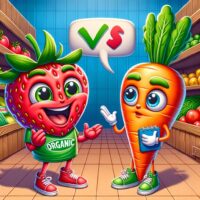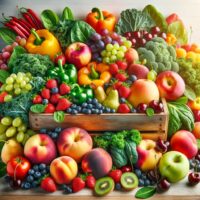Navigating Pesticides in Produce
To buy organic or conventional produce? That is the question of the day.
Organic produce, by definition, is grown without synthetic pesticides, synthetic fertilizers, or genetically modified organisms. Organic farming practices also promote ecological balance and aim to conserve biodiversity.
The debate over whether organic produce is healthier than conventional produce is ongoing. Proponents of organic produce argue that it contains fewer pesticide residues and might have higher levels of certain nutrients. 
Scientific studies have been mixed, with some showing minor to moderate increases in certain nutrients in organic produce, while others find no significant differences.
In terms of safety, both organic and conventionally grown produce are generally considered safe to eat, as long as they are properly washed. (More on various ways to wash produce in next week’s blog.)
The pesticide levels on conventional produce are typically below the safety thresholds set by regulatory agencies.
So where does that leave us?
Those particularly concerned about pesticides—such as pregnant women, children, and people with compromised immune systems—might choose organic produce as a precautionary measure.
I’m in favor of eating a wide variety of fruits and vegetables. Fresh, frozen, organic, conventional—you choose.
Since I’m not quite sure who to believe these days, I try to buy organic when it comes to the Environmental Working Group’s (EWG) Dirty Dozen.
The 2024 Dirty Dozen list from the EWG includes fruits and vegetables that they found to have the highest levels of pesticide residues.
- Strawberries
- Spinach
- Kale, collard, and mustard greens
- Grapes
- Peaches
- Pears
- Nectarines
- Apples
- Bell and hot peppers
- Cherries
- Blueberries
- Green beans

Do what is best for you and your family. Please don’t avoid eating produce because it’s on a list. The benefits of eating more produce far outweigh any possible risks.
I’ve planted my vegetable garden and will post a photo when I have something to show for my efforts. Hopefully I’ll have my own organic green beans and bell peppers. We’ll see…
Much love,
Health Coach Carol
“God made rainy days so gardeners could get the housework done.” —Anonymous


